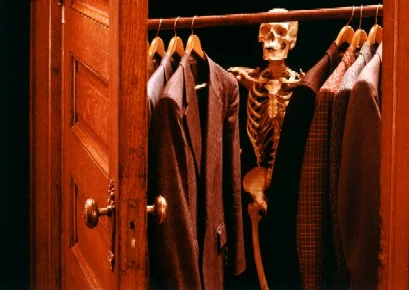By The Landlord
"To succeed in life, you need three things: a wishbone, a backbone and a funny bone." – Reba McEntire
"Parents are the bones on which children cut their teeth." – Peter Ustinov
I started school at age four-and-a-half, and during that first year, like many kids, I contracted the usual mixture of measles, mumps, chickenpox and other viruses going around that, while inconvenient and sometimes painful, helped build up the immunity system. After one period of absence of a week or more, I returned to class, but my parents, not untypical of their eccentric, slightly scatty nature, had omitted to inform the school. As I sat down and the teacher took the roll call, she asked me where I'd been. "I was ill," I said. "What was wrong with you?" she replied, with a patient smile.
"Well, I went to hospital [this was already an exaggeration, it had only been the local GP surgery for a check-up]." And then in that instant, I suddenly realised that it was far too boring to say I'd had measles or whatever, and far more interesting, and fun, to say something else. And so in front of my classmates, I boldly told the teacher, who, I noted, looked even more interested while I slightly mischievously delayed my response. "I went to the hospital to have all my bones removed." After an awkward pause, she burst out laughing.
Perhaps that was the moment in which I first realised that fiction could be more entertaining than fact, as long, of course, as narrative technique had some sort of backbone. It certainly made my teacher's day, her immediately joking about how I would surely, after that procedure, be wobbling around on the floor like a jellyfish. She didn't tell me, of course, that bone is a hard tissue, made of a type of dense connective honeycomb-like matrix, and produce red and white blood cells, store minerals, provide structure and support for the body, and enable mobility.
"No, I've got new bones now," I said, defiantly, turning my story on a sixpence. "They're made of metal. Like a robot." So there. Perhaps I'd just been inspired by catching a bit of Lost In Space or some other sci-fi on the telly. Or I was thinking of the somebody like Six Million Dollar Man (although he came later). All of which goes to show that we should never take our bones for granted. They are one of the few things that are solid in life. Which connects of course to how bones come up in the world of song, as metaphor, literal reference, in title, lyrics, or, of course, even when played as a musical instrument. Make no bones about it, they're pretty important. Making any connections yet?
Bones were perhaps not only among our ancestors' first tools, not to mention the marrow inside which stimulated the growth of cerebrum, or neocortex, but also first musical instruments. That is of course, when drumming didn't mean beating the crap out of each other, or as in Stanley Kubrick's portrayal, tossing one up in the air that would eventually be transformed into a space ship:
Playing the bone has, over the years, become considerably more dextrous, and is really far more authentic than playing the spoons, as demonstrated here by a quick-fingered Dom Flemons:
But what do bones mean to us in a bigger way? Here's Me'Shell NdegéOcello, who recently featured one of the Song Bar playlists for songs with arresting opening lines, and appropriately gives us another one here:
"We're all just bags of bones and muscle and hormones; I'll never understand what makes our minds do the things we do. It's like that statue of the monkey holding a skull. We're trying to use a thing we don't understand to understand ourselves."
There is something primevally profound at the the idea of looking at our inner structure. But instead of a monkey, or indeed a monkey holding a skull, or indeed a room of monkeys with typewriters, we can indeed produce do even better. Some Shakespeare and David Bowie, here doing a Hamlet on his Diamond Dogs Tour.
Bowie engages in some skullduggery during the Diamond Dogs tour
So when we look at bones, particularly human bones, as well as earthy wisdom, it offers up a mixture of nervous horror and comedy, and fear. That's an appropriate way to react to death, I suppose, and as Hamlet, in one of many ways, considers what piece of a work we are:
"Alas, poor Yorick! I knew him, Horatio; a fellow of infinite jest, of most excellent fancy; he hath borne me on his back a thousand times; and now, how abhorred in my imagination it is! My gorge rises at it. Here hung those lips that I have kissed I know not how oft. Where be your gibes now? Your gambols? Your songs? Your flashes of merriment, that were wont to set the table on a roar?"
Indeed. Where be your songs? Here's someone with a penchant for theatre, and deathly theatrical philosophising. "Well, personally I have no bone to pick with graveyards," quips Samuel Beckett, dryly, and slipping in the bar for an Irish whisky.
Of course our reaction to death, in theatre, could also be expressed by Eric Morecambe. You might know the punchline, but might still enjoy getting there, and still be sure it's coming:
So how to bones come up in songs? Bare bones, being bad to the bone, lazy bones, going down to the bone, dogs with bones, bags of bones, bone shaking, the feeling, from soaking to a chil in your bones, the bones of famous people from sinners to saints, meaty bones to dusty and dry, picking bones, 'boning', all types of bones are all likely to feature, and can be unearthed from the moist earth of your collections and search tools from the Delta to Delhi, not to mention of course the context evoked by this all too obvious visual joke:
What joke is on the rails today?
Bones are very vivid objects, because obviously we feel them in all kinds of ways. To be bony, particularly in the bone structure of the face is associated with attractiveness, but too bony is deathly. And in the world of fiction film and TV, from Cathy in Wuthering Heights imagining a branch tapping on her window like a bony hand, to the skeleton comically hanging in the shop of Steptoe and Son, they remind us that death is never far away. Winter is coming, we are told in Game of Thrones, and the dead will rise up to take us all. But for me the most vivid rising skeletons were created by the genius film-making of Ray Harryhausen, who pioneered incredible animation, such as this sequence in Jason & The Argonauts:
Skeletons are associated with Halloween, and are instantly imprinted on us in childhood as being scary, but can also be comical, and were the subject of some of Walt Disney's earliest pioneering work in 1929:
But perhaps some of the most visceral re-animation of the skeleton comes in Czech animator Jan Svankmajer's recreation of the Alice story. He was surely a huge influence on Tim Burton, who made The Nightmare Before Christmas. Beware of those bone creatures:
Bones remain fascinating to us, not only because of their associations, but also due to their origins. "I dreamed of becoming a scientist, in general, and a palaeontologist, in particular, ever since the Tyrannosaurus skeleton awed and scared me," said Stephen Jay Gould, and who at some point in their life has not been fascinated by dinosaur bones?
DoYouThinkHeSaurus? The Gorgosaurus
The 60s and 70s motorbike stunt rider Evel Knievel, when not talking nonsense, didn't just break records, but quite a lot of his own skeleton. "There are a lot of myths about my injuries. They say I have broken every bone in my body. Not true. But I have broken 35 bones. I had surgery 14 times to pin and plate. I shattered my pelvis. I forget all of the things that have broke."
Still, he did what he loved, and as the philosopher Henry David Thoreau put it: "Do what you love. Know your own bone; gnaw at it, bury it, unearth it, and gnaw it still."
Know your bone. He does.
So then, as you unearth, gnaw at and share the musical bones buried in your collections, it is my pleasure to announced that this week's generous guru of the graveyard, and orthopedic orator, who, appropriately, has previously covered songs about skin, is the tremendous takeitawayGuru. Gather up your bony beauties, place them in comments for last orders on Monday 11pm UK time, in time for playlists published next Wednesday. Instead of having a bone to pick, let's pick bones.
New to comment? It is quick and easy. You just need to login to Disqus once. All is explained in About/FAQs ...
Fancy a turn behind the pumps at The Song Bar? Care to choose a playlist from songs nominated and write something about it? Then feel free to contact The Song Bar here, or try the usual email address.





